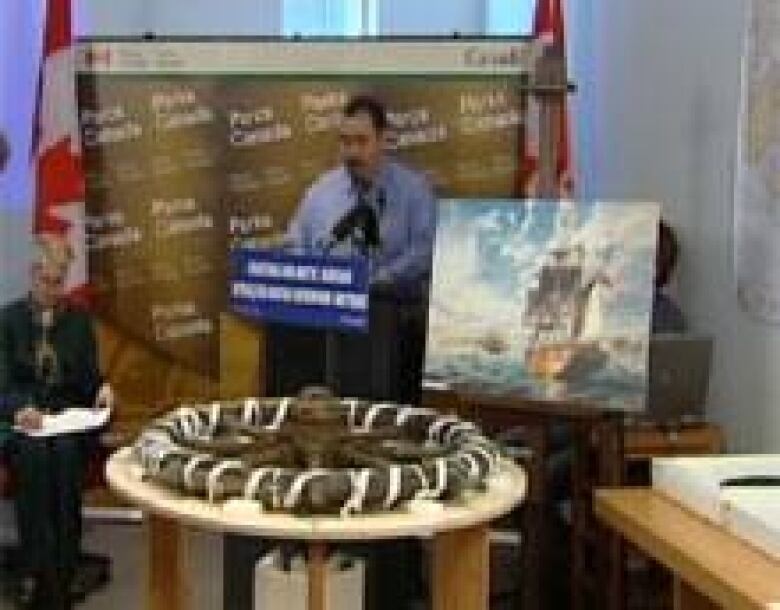Canada launches new Arctic search for Franklin's lost ships
Baird says Arctic mission 'has the allure of an Indiana Jones mystery'
The federal government is launching a new reconnaissance mission to Canada's Arctic on Monday to seek the lost ships of Sir John Franklin, whose doomed 1845 journey to the Northwest Passage has fascinated historians ever since.

Franklin had set out from England aboard the vessels in 1845, in hopes of exploring and mapping the Northwest Passage. Neither he nor any of his crewmen ever returned.
"I am sure every historian, archaeologist and storyteller is as excited about this as I am," Baird told reporters in Ottawa Friday.
"This announcement and the search for these two vessels has the allure of an Indiana Jones mystery."
Robert Grenier, a senior underwater archaeologist with Parks Canada, will lead the reconnaissance mission aboard the Canadian Coast Guard icebreaker Sir Wilfrid Laurier.
The Parks Canada team will launch a six-week expedition on Monday. If that fails, two more six-week missions are scheduled to take place over the next two summers.
Mission to assert Canadian sovereignty
Grenier led the last government-funded expedition to find HMS Erebus and HMS Terror in the 1990s. But at the time, his team did not find any clues that led to the lost vessels.
Baird said the Franklin expedition was a key part of Canada's history in Arctic exploration. At the same time, he acknowledged that next week's search will also help Canada assert its sovereignty over the North.
"We certainly think that by establishing our long-standing presence in the Arctic, that can enhance issues of sovereignty," he said.
Franklin's disappearance launched one of the greatest searches in history. By 1848, two ships and an overland party were searching for traces of the ships and the more than 100 men they contained.
A total of eight expeditions were launched within the 12 years after Franklin's disappearance, funded by a range of financial backers from the British navy to the Hudson's Bay Company to Franklin's wife.
Only traces of the expedition have ever been found.
In the mid-1980s, University of Alberta researchers discovered the graves of three of Franklin's men on Beechey Island, where they had died in 1846 as the expedition wintered there.
But the whereabouts of the ships, and of Franklin, have eluded searchers for more than 160 years.
Experts now believe the expedition came to grief in 1847 when the ships were frozen in the ice near King William Island, in central Nunavut, near the Arctic archipelago.
Inuitoral historyto play key role

"His research has provided incredibly valuable insight that will help contribute greatly to this search," Baird said.
"Local Inuit involvement has been absent in previous searches, and it will undoubtedly be a key to a successful expedition this summer or next summer."
Kamookak said his great-grandmother had told him she had come across some artifacts, including a silver butter knife, as well as discovered what is believed to be a European burial site.
Inuit oral histories also recall a ship that was afloat in the passage for several years, with its mast sticking out of the water when it finally sank.
"For the first time in over 160 years, I feel that the witnesses of [the] Franklin tragedy events have a chance to really contribute to an important search party," Kamookak told reporters.
The Nunavut government will work with Parks Canada tofind any traces of the Franklin expedition.
"There's information that has been shared about possible locations, where there may be some materials relating to the Franklin expedition," said Doug Stenton, the government's director of culture and heritage.
"Louis Kamookak from Gjoa Haven has been instrumental in providing information about where it would be."
Polar ice that has been shrinking due to global warming has made the fabled Northwest Passage more accessible, which could mean a longer time frame for the Parks Canada search crew.












_(720p).jpg)


 OFFICIAL HD MUSIC VIDEO.jpg)
.jpg)



























































































